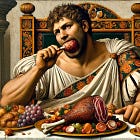How They Took Our Automatic Wins
They stole our food and our bodies, and now they're coming for our minds.
The fate of good things may be to act as Trojan horses for small evils.
In many modern cases, the evil is not so small — the debasement of humanity itself. The wells where clear water bubbled up — free for anyone to take — are now often tainted.
Our bodies, our food, and our minds are the latest victims. Caring for them a century ago was simpler and less effortful — automatic wins were provided by survival itself.
Today, those wins are reserved for an elite who seek after them and hold temptation at bay with discipline and moderation — the wins are no longer automatic. Most people can’t or won’t attain them.
Let’s discuss how this came about and what we can do about it.
Today’s “Automatic” Body:
The past had more epidemics. Cholera, scarlet fever, or polio might destroy us. But if they didn’t, we were guaranteed plenty of health-giving exercise to keep our mortal coils functional.
The farmer, the stonemason, the housewife, and the factory worker walked and lifted all day. Even the 19th-century office worker walked miles to and from work. No need for a gym membership unless that was your thing.
Those days are long past. Suburbanization, the car, and sedentary office work are great in many respects — few Americans would trade them for more physically demanding alternatives. But the cost is more brain fog and less creativity, not to mention a loss of physical capacity and accelerated aging.
Gyms are ancient, but the real mass adaptation curve to our increasingly sedentary lives began after World War II. It took several generations to norm this adaptation, but now we see how it shook out.
Only 28% of Americans move enough to ward off the downside of our sedentary culture, according to the Centers for Disease Control. Almost half get their exercise through an occupation. The rest do enough exercise willingly. They make the effort.
So less than a third of us have the traits, willpower, or occupations required to exercise adequately. The rest lean into pleasure and ease and stay on the couch. Though laws, taxes, and zoning regulations could improve some of this, the current climate makes that unlikely.
For the foreseeable future, fitness will be effortfull, and the minimum viable product looks like this:
No More Automatic Food Wins
Samuel Johnson’s 1755 dictionary had an entry for oats: "A grain, which in England is generally given to horses, but in Scotland supports the people."
Sir Walter Scott reported a Scottish retort: "Yes, and where else will you see such horses and such men?"
Human history is filled with famine and starvation, but even the poor tended to eat healthy food if they had any at all. It was the default.
There’s no better example than Ireland. Beginning around the 16th century, the impoverished and oppressed peasantry lived off a monotonous diet of potatoes, cabbage, and milk.
Yet the Irish were famously fecund and noted by their English overlords for their unusual height and robustness — more than the English possessed. The Irish population exploded, and the people were healthy enough to sustain a life of toil.
Today, we’ve solved the famine problem, but at the cost of norming a largely processed and low-plant diet that’s destroying us physically. Obesity and diseases of affluence are rampant.
Many “peasant” foods that lead to good health are still affordable, but the population prefers stimulating, quick-to-prepare, pleasurable processed foods and eats them beyond what health can withstand.
The few disciplined enough to eat well stick out from the crowd like sore thumbs — a new dietary elite dictated more by preference than economic necessity. Some mix of taxes, subsidies, and food laws could save the majority from this fate, but it seems unlikely they’d agree to such a “nanny state.”
Those who want food stanity must go out of their way to get it:
They’ve Taken Our Automatic Cognitive Wins
The newest sacrifice on the innovation altar is our minds.
It’s so new that most people haven’t internalized the need to do something about it. People pay lip service to healthier food and more exercise, but then park their brain in front of an algorithm like it’s no big deal.
Sure, binge-watching TV in the 80s probably wasn’t optimal, but no firm data suggested it caused cognitive problems for the majority. Smartphones, algorithm-driven media, and AI are different stories. You’ve seen the studies — our attention spans are cratering. Young and old are scoring lower on logic, reasoning, and reading. Depression and anxiety are on the rise.
I believe we’re at the beginning of another societal bifurcation on the scale of the diet and exercise ones. Another small disciplined elite will emerge — this time a cognitive one. They’ll do what they must to protect themselves from the forces eroding their minds and their humanity.
What will this look like? I suspect the cognitive elite will all share one trait, with several supporting elements being more varied.
The Cognitive Elite Will Focus:
If flabby bodies, heart disease, and atrophied muscles are the “tell” that you’re not part of the food and exercise elite, an inability to sustain long-term focus will let everyone know that you’re no cognitive exemplar either.
For most of human history, focus was required. Craftsmen and factory workers needed to mind their tasks. Reading a book or writing long letters by hand required concentration. Greek farmers listening to traveling rhapsodes sing the Illiad in 700 B.C. were little different than Americans sitting in a theater watching the God Father in 1972.
But an increasingly small share of Westerners can focus in this manner for work or pleasure. They even interrupt pleasurable movie and TV watching with phone scrolling. There’s a construction crew across from my home, and when sitting on my balcony the other day I watched a mason stop work to look at his phone seven times in an hour.
For office workers, the constant pull of Slack messages and dinging phone notifications guarantees they’ll never be undistracted for more than a couple minutes at a time, and they’ll pay for it.
The cognitive elite will enter internet voids and reap the rewards. They’ll realize they can increase productivity, produce higher-quality work, and enter pleasurable flow states if they sustain their focus for uninterrupted 30-120 minute stretches. They’ll realize attention is like a muscle, it can be trained and grown.
This approach will give them enough of an edge to leave the heavily distracted masses in the dust, further reinforcing their focused approach to life.
But focus is a state, not an activity. Undistracted attention on anything will improve focus, and I think part of the elite will seek a two-for-one deal. They can train focus while getting other valuable things, like a latticework of ideas bringing pleasure, peace, and utility.
Let’s explore what that might look like.
The Cognitive Elite Will Know:
The cognitive elite won’t be Luddites. They’ll see the benefits of AI and use it for the tasks that don’t degrade them. Modern tech will be just another tool, but one they keep shackled so it doesn’t enslave them like it has everyone else.
But one thing will be clear to the cognitive elite — some things must be known and permanently stored in their minds. They can’t indulge in the erosive lookup-and-forget just-in-time information model we’ve spent the last 20 years perfecting.
Using Google or Chat GPT as a research assistant is one thing, but outsourcing so much that we’re unable to build latticeworks of ideas to help us understand the world and experience awe will be out of the question. The elite’s strong focusing ability will be used to facilitate something better.
The end result is that while the elite will happily forego some forms of transient information storage, they’ll know more impactful information than average people did in the past. They’ll keep the knowledge “in house,” in their minds to improve their thinking and experience pleasure and groundedness.
If they find that AI has removed the economic rationale for writing, they’ll still write, since it helps them be less dumb. It will allow them to discover their blind spots and their mistakes and find better paths forward.
Just as the elite of the Greco-Roman world shared a kind of memory culture built with mnemonic techniques, it will again become known to our cognitive elite that retaining knowledge doesn’t have to be a slog of rote repetition, but a pleasurable experience enabled by strategies the modern world forgot..
They’ll use these techniques to remember:
Favorite bits of poetry
Therapeutic modalities to improve resiliency and find peace in turmoil.
Snatches of Shakespeare
Useful practical philosophy
Moving speeches, fictional or real
The beliefs and ideas they ascribe to.
Economic and psychological models that explain society
Anything else they find important.
If you’re interested in exploring how we can increase meaning in life through low-effort memorization, check out my course, Memorize For Meaning, where I dive into ancient techniques that facilitate the good life.
The Way Forward:
The striking thing about all these losses is that they stem from humanity getting exactly what it always wanted.
Escape from grinding physical toil is a good that went too far.
Tasty and abundant food and ending starvation are wonderful, but now they’re killing us.
Infinite knowledge and pleasurable entertainment at our fingertips are great, but now they’re melting our minds.
As quaint as it sounds, it’s now virtue that acts as the great bifurcator of humanity, since it allows us to embrace the good while avoiding being driven onto the rocks by temptation.
The future belongs to those who will embrace it:
Thanks for reading Socratic State of Mind.
If you liked this article, please like and share it, which helps more readers find my work.









Food is so interesting because, today, it's designed to be addictively tasteful. We joke about Cheetos being dusted with Cocaine but it's not far off and that addiction is where they get into your brain. Literally hijacking ancient evolutionary traits to sell marginally nutritious calories.
It'll be like Wall-E. But for our minds as well as our bodies.